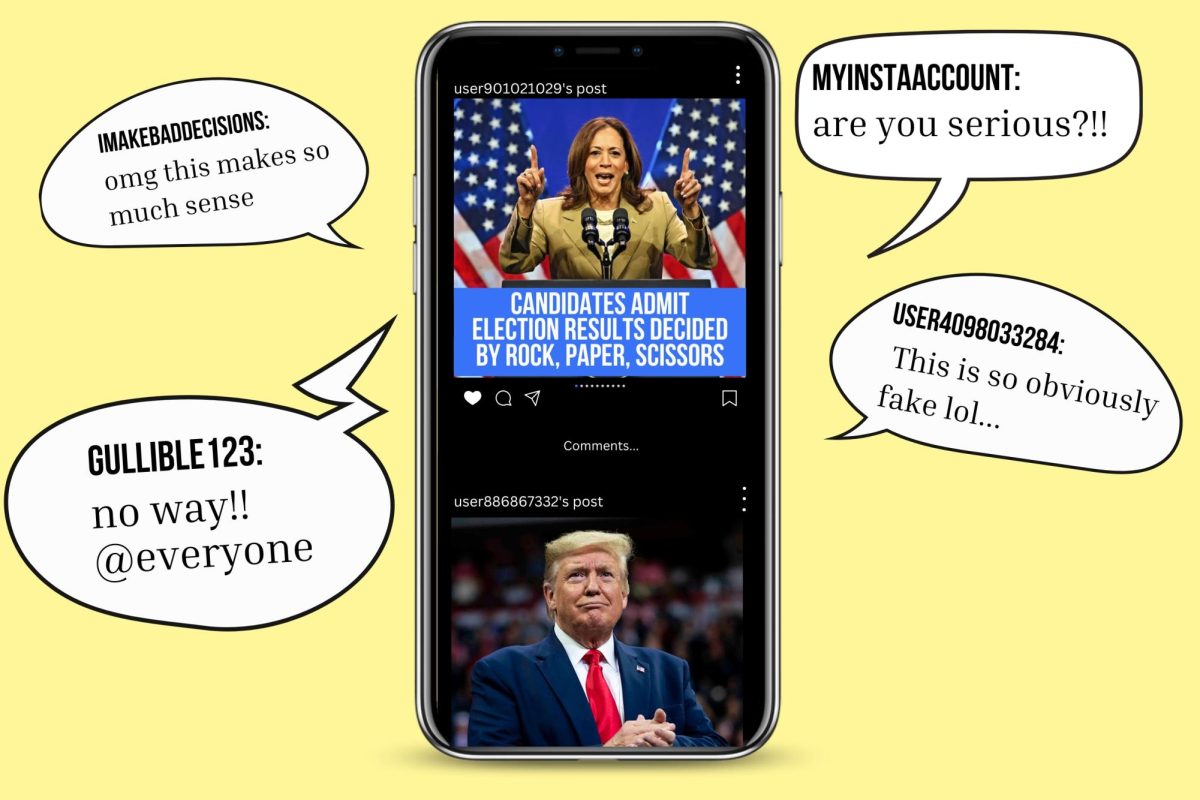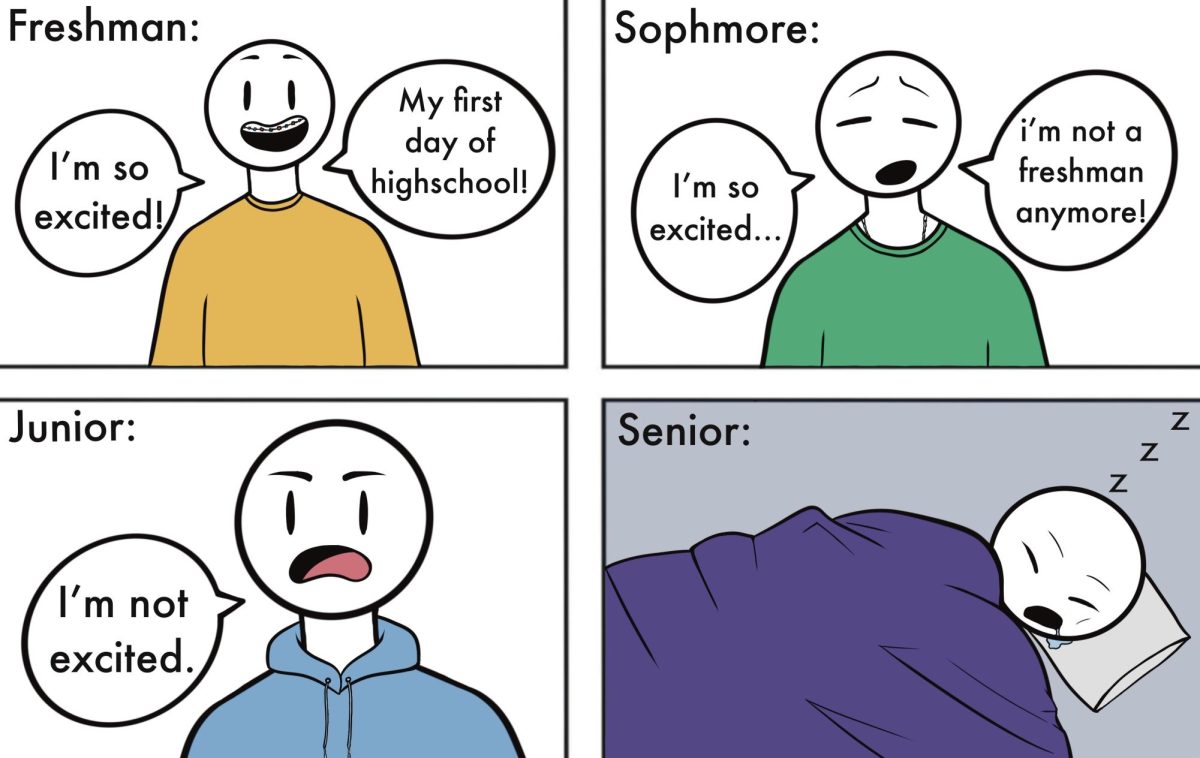Behind the byline

Just a few weeks ago, there was a newspaper deadline. As I slaved away on a Monday work night, making edits after edits to countless pages, I questioned why I was still at school at 8 p.m. on a school night. Especially considering the lack of appreciation I receive from my peers, why was I putting so much time and effort into a high school newspaper?
A week later, after distribution, I spent 10 minutes cleaning up our torn-up newspapers, drenched in milk and orange juice, from the Commons. Throughout my time in News Production, I’ve seen an unappreciation toward the paper, ranging from videos of students fueling a bonfire with pages of our stories to a video of a ‘friend’ of mine taking a bite out of a newspaper. Throughout all these instances, I kept asking myself ‘Why?’
This is my third year on News staff and throughout my time, I’ve realized that being a journalist is a lot of work. As an editor, I spend three of my seven class periods in the newsroom. If a newspaper is so much work just for a high school publication, I often wonder how hard journalism must be for professionals. Even as a high schooler, I feel unappreciated for the work I do. Many of my friends make fun of how seriously I take News Production and often only point out the tiny mistakes, rather than all the work we put into our large publications.
I can’t help but believe that journalism is underappreciated in America, especially considering the fundamental role journalism plays in society. I’m not the only one. Four in ten journalists have reportedly been harassed by someone outside their outlet, through social media alone according to the Pew Research Center. Additionally, the Pew Research Center reported that newsroom employment in the United States dropped by 26% between 2008 and 2020 alone. To maintain the American democracy we have today, Americans must start appreciating journalists more.
But what do journalists do? Not only do journalists create the content you read every day on the news, but they’re also the ones who gather the information they report on and investigate it. The first thing that happens to start a story is brainstorming. Many journalists have to come up with their own stories. Once journalists are assigned stories, the first thing they have to do is conduct extensive research on the story subject.
Then, they have to get a hold of sources. Although finding sources doesn’t seem very complicated, it can often be very hard to get people to reply. Sometimes getting a hold of people is so difficult that I have tried contacting sources for my stories through a variety of platforms, including (but not limited to) Snapchat, Instagram, Facebook, Discord and students’ parents.
Once journalists have finally contacted their sources, then the journalists have to sit down and interview those sources, transcribe the interviews and often have follow-up interviews. Additionally, many journalists are responsible for creating the layout and infographics that go along with their stories.
Journalists have played fundamental roles in American history. For example, Washington Post reporters Bob Woodward and Carl Bernstein were pivotal figures in uncovering the infamous Watergate scandal, involving then-President Richard Nixon in 1972. These journalists played a fundamental role in Nixon’s eventual impeachment.
Although journalists work to keep public figures in check, presidents in America have a long history of undermining the press. In fact, in 1972, while the Watergate scandal was being uncovered, Nixon told his national security adviser, Henry A. Kissinger, “The press is the enemy.”
Then, in 2017, A New York Times article reported that then-President Donald Trump Tweeted, “The FAKE NEWS media (failing @nytimes, @NBCNews, @ABC, @CBS, @CNN) is not my enemy, it is the enemy of the American People!”
More recently, A USA Today article said that President Joe Biden responded to a journalist’s question during a press conference with, “What a stupid son of a bitch.” Though Biden did call the reporter and apologize later, he discredited a journalist live, in front of the public.
And sure, not everyone listens to everything the president says, but considering the president is the leader of the country, many Americans listen to what they’re saying.
While America is relatively privileged in terms of press freedom, that doesn’t negate the fact that when a president makes derogatory comments about journalists, American disrespect for journalists only progresses.
A lot of the disrespect journalists receive from Americans occurs because Americans don’t trust the press. And, I understand why. There are many sources out there that are extremely biased. Even well-known sources, like the NYT, lean left and Fox News leans right, according to AllSides.
However, this association with media bias is a general guideline. Maybe only certain articles from the NYT are left and some lean right.
The great thing is that Americans have the resources to read articles from both sides. Rather than complaining about a story from Fox News being completely right-biased, try reading an article from Fox News, then an article on the same topic from the NYT, and then you can create an educated, well-rounded opinion.
Media is still a crucial component in maintaining democracy. Without it, maybe bias wouldn’t be spread, but people would also not be able to make their own educated decisions on anything.
I am a journalist because I know that I help hold the district accountable. I am a journalist for the few times someone comes up to me and says that they loved a story.
Although it’s on a lesser scale than professionals, I know that my job is important because of those few people who make an effort to tell me how much they loved the recent issue of the Image Newsmagazine.
Journalists are instrumental in maintaining democracy. They put in so much work for a minimal salary, despite the criticism and dangers they face daily. Yet, despite this, Americans still undermine and undervalue journalists.
At the very least, journalists in America deserve more recognition. America has the privilege of a free press. But, if a constant underappreciation of journalists continues, how long will it be until that privilege is hindered?
Your donation will allow our student journalists to continue their work. You may become a PATRON by making a donation at one of these levels: White/$30, Black/$50, Gold/$100. Patron names will be published on the website and once per quarter on our social media accounts.





















